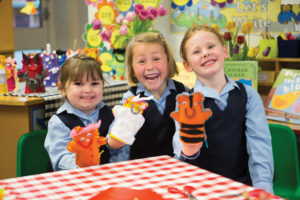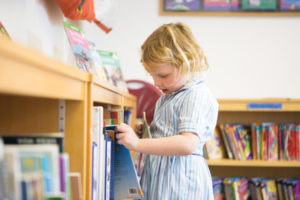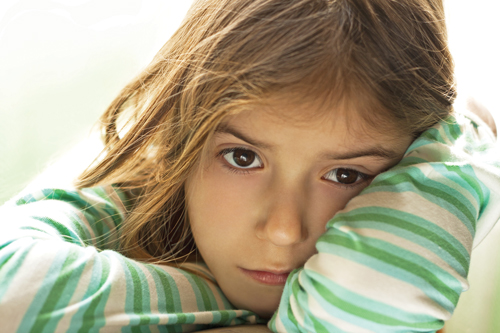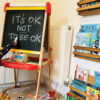by Claire Russell
founder of PlayHOORAY!
Have you ever thought about how you can better encourage your child to play more effectively? Now, we don’t all live in an ideal world, our homes have to work for many different things, as well as look nice, but there are a few simple tricks we can apply to create a more playful home.
• Turn off the TV and keep distractions to a minimum when your child is playing.
• Keep resources to hand and ensure your child knows where they are, helping them to become independent and not rely on you to find the answers.
• Teach your child how to do an activity first. Don’t assume they know how to take on the role of a shopkeeper despite the numerous times they’ve been to the supermarket with you!
• Go with the flow. If you set up an activity for your little one, but they do something totally different to what you’d intended, that is absolutely fine. Support them and encourage them to follow
their own initiative!
• If they have enjoyed playing with a particular activity try leaving it out for them to access when they want for at least a week. If you don’t like the mess, perhaps you can throw a tea towel over it?
• Praise your child for their play, the way they play and what they are doing, reassuring your child and showing them how much you value their play. After all, it is supporting their development!
• Try not to interrupt your child when they are focusing, if it can wait then let it. Young children can only concentrate for small amounts of time, so you’ll probably only be waiting for a few minutes anyway!
But what exactly should you be doing when your child is playing?
In reality, there are some days when you want your little one to play to occupy themselves so that you can take a breather because, let’s face it, it’s exhausting being a parent and its important to prioritise looking after yourself! And there are those days when you have a list as long as your arm and you just need five minutes to get jobs done or make dinner. And that’s fine too, honestly it is. We all do it! But then there are days when you do have time, you do have a flicker of energy and you have the headspace to support your child as they play – great! When that occurs, there are many things you can do that will support their development:
• Sit by your child, giving them a sense of security, reassuring them that you’re in sight while showing them that you value their play.
• If they invite you to play with them, copy them. Don’t take charge, just do what they do and let them take the lead.They will love it!
• When you feel you can, talk about what you are doing. You might feel a bit silly doing it but you are teaching your child how to play. Use words they may recognise but introduce new vocabulary too. Tell them what you like, dislike, your favourites and give reasons. Your child may offer their opinion or they may not. There’s no pressure!
• As your child plays, as long as you don’t think it will break their concentration, comment on what they’re doing. Suggest a few things you like about their playing, for example: “I like the way you are stacking the bricks to make a tall tower. I like the way you are trying to get that to stick. I can see you are persevering.”
These show your child that you value what they are doing. Your child may choose to tell you about their play and may begin running their own commentary.
These are just a few ideas you can implement to encourage play. You don’t have to do them all, try a few and see if it makes a difference.
Happy playing!
Mum to one and Early Years Specialist, Claire Russell is founder of playHOORAY! and the designer of playPROMPTS activity cards designed to equip parents with realistic, fuss-free play ideas. For further information please visit www.playhooray.co.uk

 by Naomi Bartholomew
by Naomi Bartholomew


 Perhaps the elemental nature of motherhood can’t quite be understood until we are ‘in’ our experience, or maybe we wouldn’t head on this collision course with life if we knew what was ahead? If this were the case, why do so many of us go on to do it time and again? Creating life can be addictive, because although oxytocin is understood by endocrinologists as an antidote to craving, the positive feedback mechanism that controls its release actually helps anaesthetise us a little, or diminish the sensations of discomfort, and feelings of turmoil that are intrinsically linked with pregnancy, childbirth and motherhood.
Perhaps the elemental nature of motherhood can’t quite be understood until we are ‘in’ our experience, or maybe we wouldn’t head on this collision course with life if we knew what was ahead? If this were the case, why do so many of us go on to do it time and again? Creating life can be addictive, because although oxytocin is understood by endocrinologists as an antidote to craving, the positive feedback mechanism that controls its release actually helps anaesthetise us a little, or diminish the sensations of discomfort, and feelings of turmoil that are intrinsically linked with pregnancy, childbirth and motherhood. ing a child and everything that comes with it, not just with gratitude, which helps lessen the sense of heaviness, but also with conviction, so as to empower us?
ing a child and everything that comes with it, not just with gratitude, which helps lessen the sense of heaviness, but also with conviction, so as to empower us?









